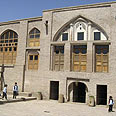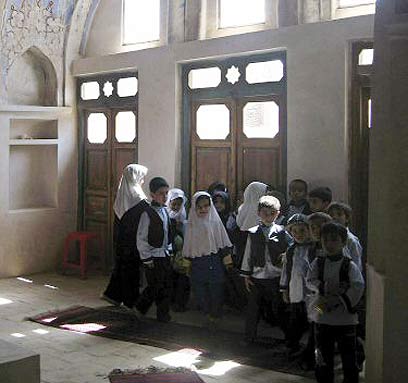
Relics of old Afghanistan reveal Jewish past
Architect Jolyon Leslie is leading efforts to preserve and restore old synagogues in west Afghanistan, where only one Jew remains today. 'It's important that locals understand that this was a very rich society in the sense of its religious diversity and pluralism,' he explains
Behind a parade of old mud brick shops, through narrow winding alleys, a tiny door opens onto a sundrenched courtyard, where school children giggle and play alongside the ghosts of Afghanistan's Jewish past.
The Yu Aw is one of four synagogues in the old quarter of Herat city in west Afghanistan, which after decades of abandonment and neglect, has been restored to provide desperately-needed space for an infant school.
When Israel was founded in 1948, the estimated 280 Jewish families that lived in Herat began leaving. Today, there are no Jews left in the city and only one left in the entire country, the last remnant of a community that dates back some 2,500 years.
The Herat synagogue, over a century old, is comprised of a modest stone courtyard framed by a series of small rooms including a main prayer room which still has a raised platform where the Torah would have been read.
Parts of the prayer room's high ceilings are decorated in painted Persian-style floral patterns and motifs.
The "mikvah," an underground chamber underneath the courtyard, has also been restored. Decades of rubbish was gutted from its cavity to reveal a natural pool of water which is thought to have been used for bathing rituals.

Synagogue turned into a school (Photos: Reuters)
"Wherever possible we try and put back the elements. We can't put back what we don't find, some of the buildings have been stripped," said Jolyon Leslie, a South African architect who leads restoration projects in Herat's old city on behalf of the Agha Khan Trust for Culture.
"What we're trying to do is protect as many old historical monuments as possible. Whether it's a mosque whether it's an ex-synagogue like this or whether it's a hamam, to try and put them in public use," Leslie said.
"It's important that Heratis understand for future generations that this was a very rich society in the sense of its religious diversity and its pluralism," he added.
Three other synagogues in the same neighborhood are being renovated. Two will also be used as schools for children living in the neighborhood. The third is now a mosque for the residents who live in a cluster of simple, centuries-old abodes.
Long gone
Afghanistan's once thriving community is believed to trace its roots to the Assyrian and Babylonian conquests in 720 B.C. and 560 B.C. when exiled Jews moved to what is now Iraq, Iran and neighboring countries such as Afghanistan.
By 1992, when the Soviet-backed communist leadership in Kabul collapsed, the community disappeared from Herat. A few have since returned to re-visit the refurbished relics of their past.
"Jewish visitors from abroad, even Herat Jews from abroad, have come back to visit these places and there's a sense of them re-owning these properties and being very proud to see them restored," Leslie said.
He recalled a recent visit by a Herati Jewish family who had traveled from Canada to visit Yu Aw. They sobbed when they saw the restored synagogue.
Jewish cemetery still intact
A few kilometers away from the old quarter, an Afghan boy unlocks a heavy wrought-iron door to an open field where overgrown thorn bushes and weeds breed unchecked around craggy and windswept white marble tombs inscribed with Hebrew.
The family which has taken care of the cemetery for the past 150 years continue to do their best to protect it, but since Herat's Jews left, they are no longer paid for the work.

Jewish cemetery in Herat
"When my grandfather worked here, they were still here and they gave him a salary. But then when the security situation got bad the last of them moved to London. And so our salary was stopped," Jalilahmed Abdelaziz said, adding that the cemetery contained about 1,000 graves.
Through three decades of conflict and the rule of the austere Islamist Taliban, Abdelaziz's family guarded the site, which is off a dirt track lined with Muslim cemeteries.
The Taliban, though responsible for harassing the family at times, resisted damaging the graves.
"The Taliban were not the worst of our problems. We had neighbors who would try and desecrate the graves or steal the stones, they were the worst, but we would tell them to stop and tell them what they were doing was unIslamic," Abdelaziz said.
"We knew all of the families here ... If they wanted to visit here they could, but they don't."










